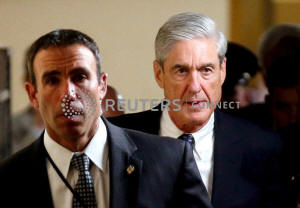|
The long and winding road to U.S. special
counsel's Russia report
 Send a link to a friend
Send a link to a friend
 [March 19, 2019]
By Sarah N. Lynch [March 19, 2019]
By Sarah N. Lynch
WASHINGTON (Reuters) - Special Counsel
Robert Mueller, examining potential conspiracy between President Donald
Trump's 2016 campaign and Russia, is leading the latest in a series of
U.S. investigations conducted by prosecutors outside usual Justice
Department channels in recent decades.
The release of the findings by previous investigators analogous to
Mueller has been handled differently over the years, sometimes with
voluminous reports and other times with no reports or with key elements
kept under wraps for months and even years.
Mueller is preparing to submit a report to U.S. Attorney General William
Barr on his findings, including Russia's role in the election and
whether Trump unlawfully sought to obstruct the probe. Trump has denied
collusion and obstruction. Russia has denied election interference.
Barr already is coming under pressure from lawmakers to make the entire
document public quickly, though he has wide latitude in what to release.
Here is an explanation of some past high-profile U.S. investigations and
how their findings were made public.

WATERGATE SCANDAL
The Justice Department named a special prosecutor to investigate the
Watergate scandal that eventually forced Republican Richard Nixon in
1974 to become the only U.S. president to resign from office. At the
time, no specific regulations or laws governed special prosecutors.
Attorney General Elliot Richardson, as a condition of his Senate
confirmation, appointed Archibald Cox as a special prosecutor to examine
the 1972 break-in by Republican operatives at Democratic headquarters at
the Watergate complex in Washington.
Cox found himself at odds with Nixon over subpoenas to obtain taped
White House conversations. Nixon ultimately ordered the firing of Cox,
and several top Justice Department officials resigned in protest
including Richardson, in an event dubbed the Saturday Night Massacre.
Leon Jaworski, subsequently named as the new Watergate special
prosecutor, prepared a report with his findings, known as the "road
map," to assist Congress with possible impeachment proceedings to remove
Nixon from office.
The House of Representatives Judiciary Committee used it as a basis for
hearings and passed articles of impeachment, though Nixon quit before
the full House could act. The "road map" remained under seal by a
federal court for 55 years until it was released by federal archivists
in 2018.
IRAN-CONTRA AFFAIR
The job of independent counsel, with broader powers, was created by
Congress after the Watergate scandal. In 1986, Lawrence Walsh was named
as independent counsel to investigate the Iran-Contra affair involving
illegal arms sales to Iran under Republican President Ronald Reagan,
with the proceeds diverted to fund rebels in Nicaragua called Contras.
The probe lasted nearly seven years and led to criminal charges against
14 people. The convictions of some prominent officials - Oliver North
and John Poindexter - were overturned on appeal. In 1992, Republican
President George H.W. Bush pardoned others.
Walsh submitted his final report to a federal court in 1993, which had
the power to release it publicly but was not required to do so. Its
release was delayed after people named in the report sued to keep it
suppressed. A federal appeals court ruled in 1994 that it should be
released in the public interest. Walsh then unveiled it at a news
conference.

WHITEWATER AND LEWINSKY SCANDALS
Attorney General Janet Reno in 1994 appointed Robert Fiske as a
independent counsel to investigate allegations of impropriety by
Democratic President Bill Clinton and first lady Hillary Clinton
regarding real estate investments in the Whitewater Development
Corporation. Fiske's probe was expanded to include reviewing the death
of Deputy White House Counsel Vince Foster, which police had ruled a
suicide.
[to top of second column]
|

Special Counsel Robert Mueller (R) departs after briefing members of
the U.S. Senate on his investigation into potential collusion
between Russia and the Trump campaign on Capitol Hill in Washington,
U.S., June 21, 2017. REUTERS/Joshua Roberts/File Photo

Fiske, who was not subject to the independent counsel law because it
had temporarily lapsed, publicly released a 200-page interim report
in 1994 clearing White House officials of wrongdoing in the
Whitewater affair and confirming that Foster's death was a suicide
unrelated to Whitewater.
On that same day, Clinton signed a law reauthorizing the independent
counsel statute, which paved the way for a federal court to replace
Fiske as independent counsel with Kenneth Starr. Starr turned in a
report on Foster's death to federal courts in 1997, also finding no
foul play. It remained under seal for three months before being
released.
Starr's probe expanded into other areas, including a sexual affair
between Clinton and White House intern Monica Lewinsky and alleged
improprieties in the White House travel office. His expansive
445-page report, containing explicit details on Clinton's sexual
affair, was sent to Congress in 1998. Two days later, lawmakers
voted to release it publicly. Its findings triggered an unsuccessful
Republican effort to remove Clinton from office through the
impeachment process.
Congress let the independent counsel law expire, with some lawmakers
believing Starr went too far. The Justice Department in 1999 wrote
regulations creating the new job of special counsel, with more
limited powers.
FEDERAL RAID AT WACO
Reno in 1999 appointed John Danforth as special counsel to
investigate the 1993 federal raid on the Branch Davidian cult
compound in Waco, Texas. The FBI used tear gas and a fire broke out,
killing more than 70 people including cult leader David Koresh.
Danforth was the first person appointed under the 1999 regulations,
the rules that now apply to Mueller. Under those rules, a special
counsel must submit a confidential report to the attorney general,
who then has discretion to publicly release some or all of it. The
attorney general must weigh the public interest. But he also must
consider thorny issues such as secrecy of grand jury testimony,
protecting classified information, communications with the White
House possibly subject to the principle of executive privilege
shielding certain information from disclosure, and safeguarding
confidential reasons for why some individuals were not charged.
Reno specifically instructed Danforth to prepare two versions of his
report, a confidential one and another for public release. Rod
Rosenstein, the Justice Department's No. 2 official, gave no such
instruction to Mueller when he appointed him in May 2017.

In 2000, Danforth held a news conference to publicly release his
report, exonerating federal agents and Justice Department officials
of any wrongdoing.
OUTING OF CIA AGENT PLAME
In 2003, James Comey, then the Justice Department's No. 2 official,
appointed Patrick Fitzgerald as special counsel to investigate how
CIA operative Valerie Plame's cover was blown through media leaks.
Fitzgerald was not appointed under the 1999 regulations and was not
bound by them.
Fitzgerald held a 2005 news conference to announce that a grand jury
had returned a five-count indictment against Vice President Dick
Cheney's chief of staff, I. Lewis "Scooter" Libby, for obstruction
of justice, perjury and making false statements. Fitzgerald never
published a final report on his findings.
A jury convicted Libby. Republican President George H.W. Bush
commuted his sentence in 2007. Trump gave Libby a full pardon in
2018.
(Reporting by Sarah N. Lynch; Editing by Will Dunham)
[© 2019 Thomson Reuters. All rights
reserved.]
Copyright 2019 Reuters. All rights reserved. This material may not be published,
broadcast, rewritten or redistributed.
Thompson Reuters is solely responsible for this content. |